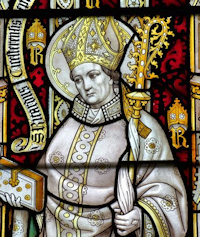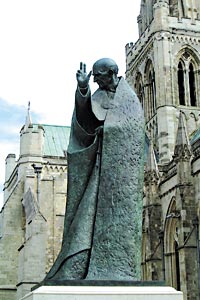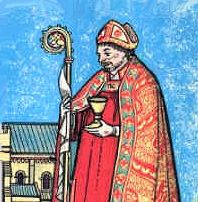Lent: April 3rd
Saturday of the Fifth Week of Lent
Other Commemorations: St. Richard of Chichester, Bishop (RM)
» Enjoy our Liturgical Seasons series of e-books!
"I shall rescue them from all the betrayals they have been guilty of; I shall cleanse them; they shall be my people and I will be their God."
Today's Station takes place in the Church of St. John before the Latin Gate. This ancient basilica is built near the spot where the beloved disciple was, by Domitian's order, plunged into the cauldron of boiling oil.
Meditation - Christ's Last Days
Every person who loves Christ now tries his best to remain close to his suffering Savior during the last hours of His earthly life. The liturgy places us directly in the midst of the recorded events and expects us to participate. During these next days, therefore, we will traverse each road with Jesus.
Yesterday (Friday) He came with His disciples from the desert village of Ephrem to Jericho. When near the Jordan we heard from His lips the third prophecy of the crucifixion. Then Salome approached with her two sons, John and James, and begged important positions for them in the coming kingdom. This gave Jesus the opportunity to proclaim His wonderful teaching on humility. We stand close and listen.
The Lord enters Jericho. I am Zacheus, the chief publican, the little man who wants to see the Messiah from a tree. He looks up to me and says, "Today salvation has come to your house!" He stays two nights with me, a despised publican!
Over the Sabbath Jesus remains in Jericho. The next day (Sunday) He starts for Jerusalem at the head of a lordly caravan. Along the road there sits a blind beggar. It is I, again. "Jesus, Son of David, have mercy on mel" He heals my eyes, I see, I am enlightened!
In procession we pass through Jericho's inhospitable ravines up to Jerusalem. Night intervenes and Jesus stops at Bethany. He is joyously welcomed by Martha and Mary. Am I an active Martha or a meditating Mary? Possibly it was on this Sunday evening that the memorable meal took place when, with Lazarus present and Martha as hostess, Mary poured out the costly ointment for Jesus' burial. It was the act which estranged Judas completely from his Master.
In solemn procession on Monday afternoon the King of Israel comes to the top of Olivet, weeps over Jerusalem, and then continues on to the temple. We feel ourselves part of this festive procession, waving palms in our hands. We accompany our King and watch Him drive the money-changers out of His Father's house. Tuesday morning He returns with His disciples and while crossing Mt. Olivet curses the unfruitful fig tree, a figure of the Jewish people. This barren tree is likewise a warning for us.
Verbal encounters with the Jews take place in the temple courtyard until Wednesday afternoon when Christ hurls His eightfold curse upon Pharisee and Jew, and leaves the temple forever. With His disciples He then proceeds to the Mount of Olives and delivers His powerful discourse on the end of the world and the destruction of Jerusalem. Present in spirit we hear this sermon and take to heart His final admonition, "Be vigilant!" Meanwhile Judas has left the circle of disciples and offers his assistance to the chief priests.
Thursday morning Christ sends Peter and John from Bethany into the city to make the needed preparation for the Passover meal. As evening falls He bids farewell to His mother and His friends and goes with His apostles to the Upper Room in Jerusalem for His "Last Supper" with them.—In mind and in heart we will follow our Blessed Lord closely during these sacred days of Holy Week.
St. Richard of Chichester
 St. Richard was born in 1197 at Wiche, near Worcester, England. When quite young, he and his elder brother were left orphans. Richard gave up his studies in order to manage his brother's impoverished farms. He succeeded so well that his brother desired to make over the estate to him. Richard refused not only the estate, but the opportunity of a brilliant marriage, since he desired to give himself to God's service. He resumed his studies which he had begun at Oxford, then in Paris. Returning to England he won his Master of Arts at Oxford, and then went to Bologna, Italy, to study canon law.
St. Richard was born in 1197 at Wiche, near Worcester, England. When quite young, he and his elder brother were left orphans. Richard gave up his studies in order to manage his brother's impoverished farms. He succeeded so well that his brother desired to make over the estate to him. Richard refused not only the estate, but the opportunity of a brilliant marriage, since he desired to give himself to God's service. He resumed his studies which he had begun at Oxford, then in Paris. Returning to England he won his Master of Arts at Oxford, and then went to Bologna, Italy, to study canon law.
St. Edmund, Archbishop of Canterbury, appointed him his Chancellor, and he accompanied the Archbishop when he was banished to France. After his death, Richard retired to a convent of Dominican Friars in Orleans, France, where he was ordained Priest.
When Bishop Nevil of Chichester, England, was dying, King Henry III recommended an unworthy court favorite to the See. The Archbishop declared him unqualified and the presentation void. He preferred Richard of Wiche to that dignity. Richard was consecrated in 1245, but the King refused to recognize the election and seized the revenues of the See. Richard suffered many hardships and persecutions for two years, repaying with favors those who persecuted him. He pleaded his cause before Pope Innocent IV against the King's deputies, and obtained a confirmation of his election.
 St. Richard performed his episcopal duties with fervor and charity towards his flock, and thoroughly reformed his See. After two years his revenues were restored. He preached the word of God with that unction and fruitfulness which only an eminent spirit of prayer could produce. Penitent sinners he received with great tenderness and charity, but when the rights of the Church were questioned he remained obdurate, fearing no consequences.
St. Richard performed his episcopal duties with fervor and charity towards his flock, and thoroughly reformed his See. After two years his revenues were restored. He preached the word of God with that unction and fruitfulness which only an eminent spirit of prayer could produce. Penitent sinners he received with great tenderness and charity, but when the rights of the Church were questioned he remained obdurate, fearing no consequences.
While preaching a holy war against the Saracens, at the Pope's command, St. Richard fell ill. He foretold his death, dying in a hospital at Dover on April 3, 1253, at the age of fifty-six. His body was conveyed to Chichester for internment in the Cathedral before the altar he had erected. Miraculous cures occurred at his tomb. The Saint was solemnly canonized by Pope Urban IV in 1262.
—From Heavenly Friends: A Saint for Each Day by Rosalie Marie Levy
Patronage: coachmen; Sussex, England; city of Chichester, England; diocese of Chichester
Symbols and Representation: bishop with a chalice on its side at his feet because he once dropped the chalice during a Mass and nothing spilled from it; kneeling with the chalice before him; ploughing his brother’s fields; a bishop blessing his flock with a chalice nearby
Highlights and Things to Do:
- Read more about St. Richard:
- Chichester Cathedral had a shrine dedicated to St. Richard and was a center of pilgrimage. In 1538, during the reign of Henry VIII, the shrine was plundered and destroyed by order of Thomas Cromwell. See this site for more details about St. Richard's relics.
- Richard of Chichester is the patron saint of Sussex in southern England; since 2007, his translated saint's day of June 16 has been celebrated as Sussex Day.
- The prayer from which the Hymn "Day by Day" takes its lyrics is attributed to St. Richard:
Thanks be to my Lord Jesus Christ
for all the benefits thou hast given me,
for all the pains and insults thou hast borne for me.
O most merciful redeemer, friend and brother,
may I know thee more clearly,
love thee more dearly
and follow more nearly.






